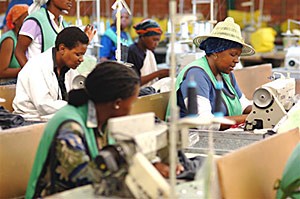The recent decision by the United States to reduce tariffs on Lesotho’s textile exports from a threatened 50% to 15% offers some relief to the industry, but the change comes too late to reverse the substantial losses already suffered. Lesotho’s textile sector, the country’s largest private employer and primary export earner, has been heavily reliant on preferential access to the U.S. market through the African Growth and Opportunity Act (AGOA). The initial announcement of a 50% tariff in April 2025 caused immediate disruption, including cancelled orders, factory closures, and significant job losses.
Producers of garments for major U.S. brands such as Levi’s and Walmart reported drastic reductions in output, with some factories cutting their workforce by up to 40%. The Minister of Trade indicated that as many as 12,000 jobs remain at risk. This volatility has highlighted the vulnerability of companies dependent on a single export market and the need for legal and commercial safeguards when operating in international trade. Many exporters found themselves grappling with suspended or cancelled contracts, underscoring the importance of incorporating clauses into supply agreements that address tariff changes, trade restrictions, and geopolitical risks.
From a legal perspective, affected businesses should urgently review existing agreements with foreign buyers to ensure there are clear provisions for managing unforeseen changes in trade policy. Given the uncertainty in global trade, diversification of export destinations beyond the U.S. is essential to reduce dependency on one market. Where retrenchments are unavoidable, employers must strictly follow the requirements of Lesotho’s Labour Act, including consultation processes and severance pay obligations, to avoid litigation or reputational damage.
The Government of Lesotho may also need to consider diplomatic engagement, trade negotiations, and other remedies under international trade law to safeguard the interests of its industries. Although the reduction to a 15% tariff may encourage some buyers to resume orders, restoring investor confidence will take time. Businesses will need to adapt by strengthening contractual protections in cross-border transactions, ensuring compliance with both domestic and international regulations, and closely monitoring further developments in U.S. trade law and AGOA eligibility.
Our firm assists clients in navigating these challenges by drafting and reviewing international supply contracts, advising on trade compliance, managing workforce restructuring in line with labour law, and representing companies in trade-related disputes. For businesses impacted by the recent tariff changes, proactive legal planning and market diversification will be critical in building resilience against future disruptions in the global trading environment.

